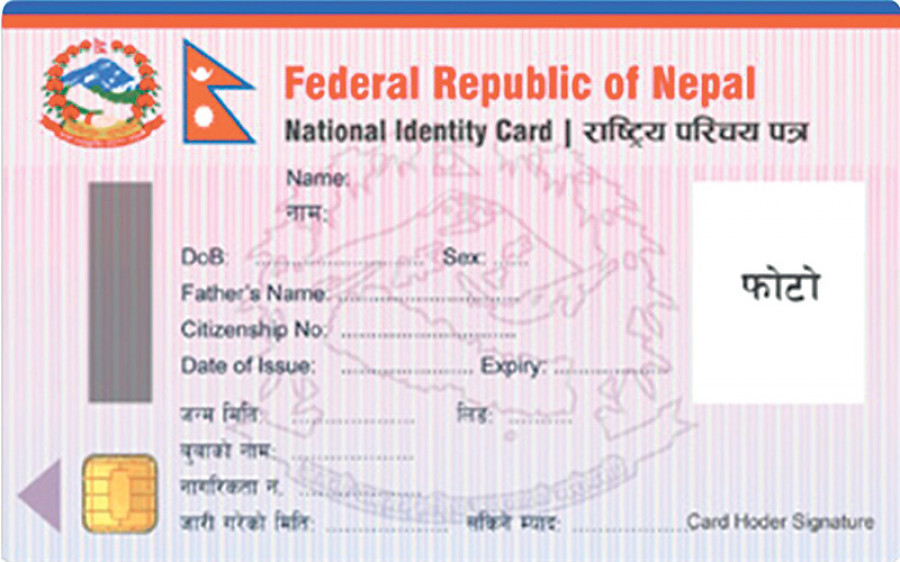National
Data collection for national ID card distribution hits snag
Against the target to collect the details of 10 million people, the government may only be able to collect the details of 4.45 million people because of Covid-19 scare, officials say.
Prithvi Man Shrestha
The Covid-19 pandemic has emerged as a setback for the plan to collect personal details of 10 million people for the National Identification Cards with the government admitting that the details of less than half the targeted population could be collected by the end of the current fiscal year.
In the first phase, the government had planned to collect personal details of 10 million people in 38 districts and distribute national IDs to them.
“We can now collect details of only 4.4.5 million people in the current fiscal year if the emerging threat of the second wave of coronavirus crisis does not hit the country,” said Jitendra Basnet, director general at the Department of National ID and Civil Registration.
“Our effort to collect details was disrupted till December last year and collecting the details of the 10 million population in the remaining period of the current fiscal year is impossible.”
According to the department, it has collected details of just 2.5 million individuals so far. According to Basnet, gathering the details of people living in nine districts—Panchthar, Tehrathum, Sankhuwasabha, Okhaldhunga, Chitwan, Gulmi, Kanchanpur, Dadeldhura and Achham—has been over.
“We are running a data collection campaign in 16 districts and we have plans to collect data in a total of 32 districts this fiscal from the 38 initially planned,” said Basnet.
The government plans to introduce national identification cards that contain personal and biometric details of citizens with a unique number. The card is to become a key basis for the delivery of various government services.
Once implemented, the card, which bears the holder’s name and surname, address, father’s name, mother’s name, photo and prints of both the thumbs and index fingers, will replace the existing citizenship card.
The biometric smart card, according to the department, will have multiple applications and can be read by officials using highly secure terminals.
Due to the pandemic, the government had to change its approach to data collection—first in densely populated areas before focussing on sparsely populated hill and mountain districts.
In the early months of the fiscal year 2020-21, the department didn’t want to take the risk of infections during data collection as a person has to give his or her biometric data by touching the machine. Officials said many people touching the same machine could be a medium for virus transmission and had given up the initial plan to go to densely populated areas.
The department then prioritised the sparsely populated hill and mountain districts for data collection where the threat of coronavirus transmission could be lower. The programme gave up its plan to collect data in Lalitpur’s urban areas but representatives visited the rural areas of the district for the purpose. “In fact, we collected personal data only in Pokhara and Hetauda among the large urban centres,” said Basnet.
After collecting the data on about 10 millions, the department plans to reach all the people eligible to vote in the second phase. Besides accessing government services, the national ID can also be used for voting in national elections, according to officials.
The department plans to start distribution of the national identification cards as early as early next fiscal year 2021-22.
“We have already invited global tenders for the procurement of 12 million cards, which we expect to receive by June if the tender process goes as per the plan,” said Basnet. “We already have necessary software and printers to print the cards by installing the biometric data.”
In November 2018, Home Minister Ram Bahadur Thapa inaugurated the distribution of national identity cards in Panchthar district by handing over the first card to 101-year-old Bhagawati Devi Bhandari of Phidim Municipality-4. The move came under the pilot programme. As many as 117,000 cards have been issued so far.




 13.12°C Kathmandu
13.12°C Kathmandu














